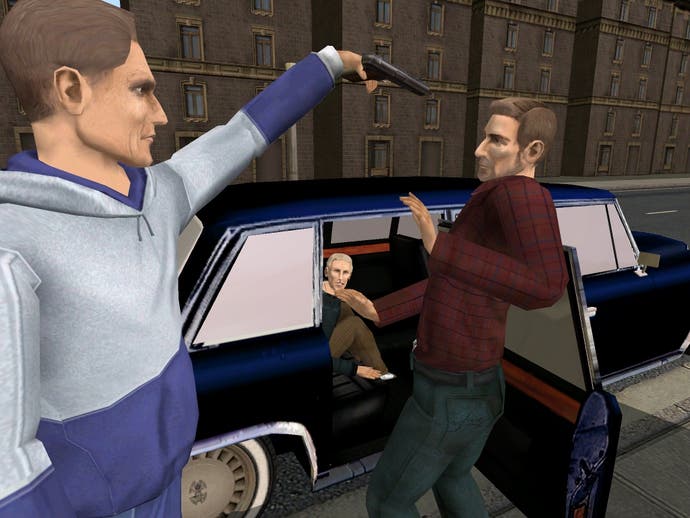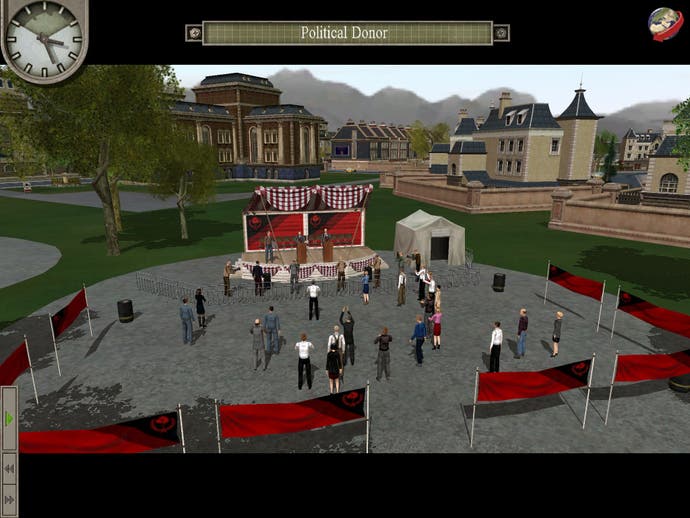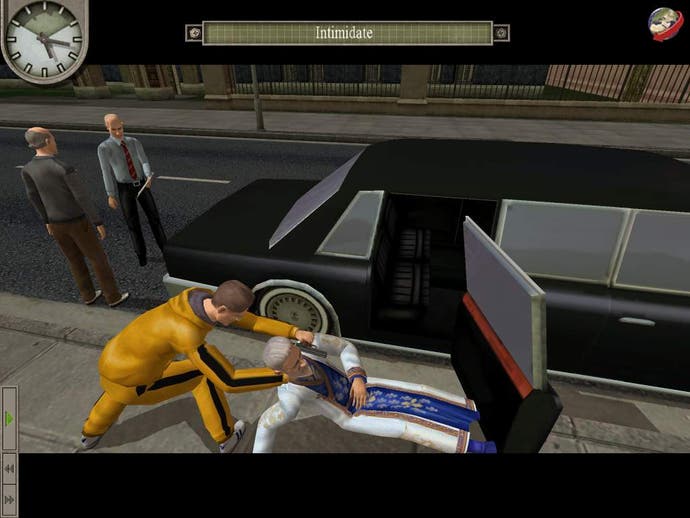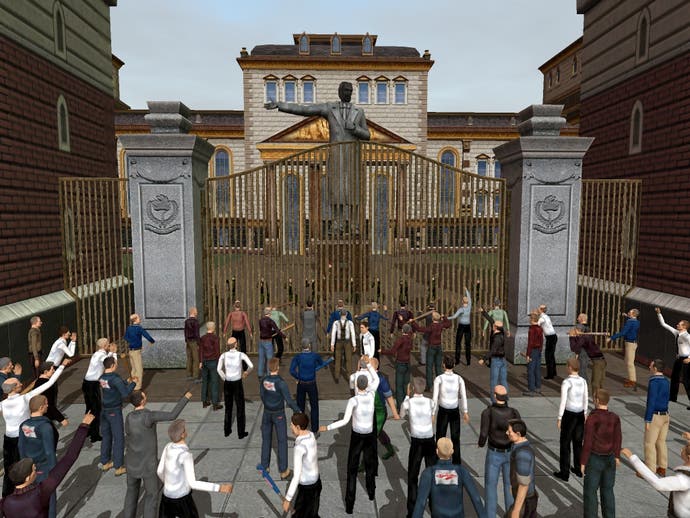Republic: The Revolution
We left Rob in charge of his own country again. Oops!
Considering that the game is only hitting shelves in UK retailers today, it's quite amazing how much opinion among gamers is already polarised by Republic: The Revolution. In development for more years than we can care to remember, publicised with regular fawning articles in games magazines, and coming laden with some of the most extravagant promises about gameplay and graphics that any game has ever had to bear, Republic is a game which seems custom-made for reviewers to rip to shreds with sadistic glee - as some of them undoubtedly will. The question is, are they justified in doing so? Just how many of the outlandish claims made for Republic have turned out to be untrue - and stripped of the hype, is the game actually any good?
Power! Domination! Control!

The basic principle behind Republic is actually quite a simple one; you play the leader of a revolutionary faction in the fictional Eastern European state of Novistrania, and must increase your power base by recruiting competent minions and sending them around performing a variety of tasks ranging from support-gathering political actions to violent or dirty tricks on your opponents.
Each city in the game is divided up into a number of districts, each of which has a unique set of values and demographics. The three basic resources and vital factors in the game are force, influence and wealth, and each district aligns itself through a division of these factors. Working class districts, for example, tend to be Force districts; prestige business areas align to Wealth. Your level of support among the people of a district (measured as a percentage) grants you a certain number of resource points from that district each day.
You then spend your resource points on a huge variety of actions which your lieutenants can carry out; vandalising the property of an enemy faction, for example, costs Force points, while destroying the reputation of one of the enemy lieutenants might cost Influence points. It's a system which takes a little bit of getting used to - and the game doesn't actually make it very obvious that this is how things work, unfortunately - but it's quite simple at heart and anyone who's played an even remotely complex tabletop game will settle into it with ease.
Sex Up Your Dossiers

On top of this simple basis for the game is built a relatively complex set of additional layers. You also have to keep an eye on the loyalty and commitment of your lieutenants, persuade key community figures to aid your cause (through a bizarre sub-game which sees you allocating conversation "points" and playing them off against your opponents points - a bit like a Top Trumps card game, in effect) and maintain a balance between the need for publicity to drive popular support, and the need for secrecy to keep away from the watchful eyes of the government and your enemies.
All of this is achieved in broadly the same way - you set up tasks for your lieutenants to perform on a timeline (which looks suspiciously like a Microsoft Project layout, if you're familiar with that sort of thing), and they go off and do them. Tasks, people and vital locations are represented in icon form on top of a colourful map of the city districts, which also shows you your support levels and the activities of your enemies in each of the districts.
This gameplay mechanic would, quite probably, work very well in a free-form environment - however, Elixir have chosen instead to lead you through the game by the nose, with a sequence of mission objectives which you must achieve. Some people probably won't like this aspect of the game, but we felt that it gave the experience much-needed structure and a concrete set of goals to achieve - and to be fair, you are given a massive degree of freedom in between goals, and can go off and do whatever you like on the map before coming back and completing the objective in question.
The Buck Stops Here

So far, so good - but sadly, while the core gameplay ideas behind Republic are solid (if very hardcore, much more so than even the most complex PC real time strategy game), the implementation of those ideas leaves a lot to be desired. The interface of the game is one of the most awkward, poorly thought out graphical interfaces we've ever had the displeasure of encountering, crammed as it is with a myriad of poorly labelled buttons and controls. Tooltips are occasionally helpful, but are often downright cryptic or simply missing entirely from the controls.
Even the help screens aren't shockingly, well, helpful when trying to work out what on earth is going on; sometimes actions fail for incredibly obscure reasons, and at that point your only recourse is to go and dig out the manual for the game and wade through acres of text to try and work out why. Some will disagree, but we're of the opinion that a game which forces you to read the paper manual in order to proceed is inherently flawed.
The other real problem here is the nagging feeling that Republic is a very simple game which has had layer upon layer of unnecessary complexity - both in terms of additional gameplay mechanics and hideously convoluted interface - have been heaped in order to make it all look more interesting. In ways this isn't a bad thing, and it does add much-needed variety to the game, but ultimately we still walked away from each marathon playing session with Republic feeling like we'd just spent hours dealing with the "civil unrest" bits of Civilization III - without any of the fun bits. This feeling is only enhanced by the fact that while the game is turn based (three turns a day, representing morning, afternoon and night), there's actually no apparent way to skip to the end of a turn - all you can do is speed up the clock fivefold, so if you're finished doing everything in a given turn, you still have to sit around until the end of that time period before doing anything else.
The Infinite Monkeys Engine

Hang on, I hear you cry (this is a lie, but bear with me). Didn't Elixir bounce up and down about the amazing graphics that Republic would feature? The Infinite Polygon Engine, and all that twaddle? Why haven't you fawned over the graphics yet in this review, eh?
There's a simple reason for this; quite frankly, the graphics engine in Republic is the single most superfluous use of 3D graphics we've ever seen in a game. You spend practically the whole game in a zoomed out 2D mode, occasionally dropping in to the 3D city for a distressingly unskippable cutscene featuring badly animated characters speaking to each other in something that sounds like Russian recorded backwards (yes, there's no proper voice acting in the game), or to watch a special event in the game. Annoyingly, several actions can only be carried out in this 3D view - annoying because it's a complete pain to navigate due to some extremely odd camera controls and a general lack of useful icons on key buildings and so on.
Admittedly, it all looks quite pretty, and on a technical level we're quite impressed with the ability to load in a full-size city and let you zoom around without any further load delays. However, for an engine which has been under development for so long, there are some unforgivable bugs - in one early cutscene, the whole front of a building "pops" from being a single badly textured polygon into a full-resolution model while you're not more than 30 yards away from it, and many of the cutscenes and city zones in the game chug horribly even on a high spec machine (we tested Republic on an Athlon XP 1800+ system with a GeForce 4 Ti4600 and 1Gb of RAM - frankly we don't expect to see massive slowdown when the game puts five characters on screen at once on a rig like that).
Championship Politician?
We're sure that the tech used in Republic is quite good in some respects, and we'll be interested to see what Elixir's next project, Evil Genius, does with the same technology. However, in this game all it serves to do is prove that Championship Manager has the right idea - if you're going to make a complex management simulation, give it an interface which is suited to handling masses of statistics and information in a competent way. Republic would quite probably work excellently as a well-implemented "spreadsheet" style game; the 3D element is worse than pointless, and just gets in the way of the gameplay.
That being said, Republic is actually quite entertaining in a way which will appeal to the "beard and sandals" contingent of PC gamers. It's effectively a quite competent tabletop game translated into PC form - you can see heavy influences from something like Risk being thrown into the mix. It's certainly a game that you can get deeply involved with for several hours if you've got nothing better to do - but the extravagant claim that this is a game you'll be playing for the rest of your life is one we don't see any evidence for here.
If you love hardcore simulation titles like Master of Orion, then this political version of Championship Manager may be for you. If you get heavily into games of Risk, then you may well enjoy Republic. However, don't be fooled by the screenshots or the hype; this is a slightly above average political simulation title which would have probably worked better as a board game than as a videogame, shackled down with a 3D engine that serves no useful purpose and is almost entirely non-interactive. If all that was attracting you was the promise of infinite polygons or of innovative gameplay, our best advice would be to steer well clear.

